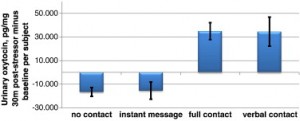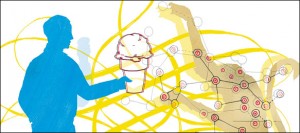It’s only the second week of university and I’m already stressed out. The F-bombs have been dropping like no tomorrow: mention of the Finals, the Future and the Forecast (I mean who doesn’t long for “mostly sunny with a high of 26 degrees”?) has got me stressed like never before. But the real question is: How do I cope with all this stress?
A study out of University of Wisconsin-Madison shows that picking up the phone to cry “Mommy!!!” and having her comfort you is just as good as having mom give you a hug.
Once the results of this initial experiment were in, the next logical question for biological anthropologist Leslie Seltzer was whether it’s your mom’s tone of voice or the things she’s actually saying that reduced stress levels.
A follow-up study was conducted on 68 girls between the ages of 7 and 12 who participated in tasks in math and verbal skills. And just in case that wasn’t nerve-wracking enough, the experimenters had the girls do the tasks in front of an audience.
Who wouldn’t feel stressed after that?
After such a daunting activity, the girls were randomly assigned to different groups. Two groups acted as controls while the others were set up to test for tone vs. content. One of the groups was allowed to contact their mothers over the phone while another group was allowed to contact their mothers via instant messaging for support. Later on, samples of their saliva and urine were collected to analyze the levels of cortisol and oxytocin.
Salivary cortisol, also known as the “stress hormone,” is secreted in high concentrations in response to the body’s fight-or-flight response. Oxytocin is a hormone that not only establishes maternal behaviour by stimulating milk ejection but is also inhibited in response to high levels of stress.

Higher levels of urinary oxytocin are observed in girls who can touch their mother as well as girls who can hear their mother. Image by: Leslie J. Seltzer
It turns out that just by hearing their mom’s comforting voice, the girls’ oxytocin levels rose significantly while the levels of the stress-inducing cortisol decreased.”
Researchers also found that no matter how eloquently your mother can write a text, it doesn’t produce the same effect as hearing her speak. The girls who used instant messaging didn’t release oxytocin. Not only that, but they also had salivary cortisol levels as high as the control group that didn’t interact with anyone for support.
So if it isn’t the intricacies of human language these girls are finding comfort in, then I wonder if comfort works in similar ways across species. Wait a minute, there are still questions to be answered within our own species…Do boys display the same behaviour when being comforted by their moms? And wouldn’t this study depend on the type of relationship these children and mothers have?
Dr. Seltzer, you have definitely left me hanging with some unanswered questions…
References: The Actual Study, News Article, Additional information about oxytocin and cortisol


















